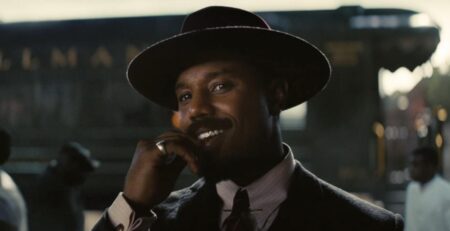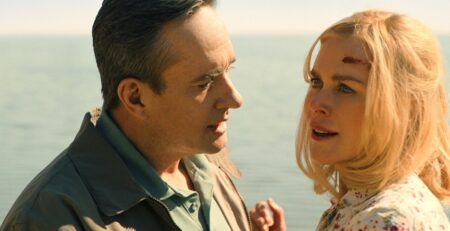
Content Warning; The Last Duel and this review discuss rape.
Every now and again, a film tries a non-traditional narrative structure to showcase perspective and identity through the story. In The Last Duel’s case, Ridley Scott aims to tell one story from three points of view, splitting the film into three chapters trying to embody the old adage that there are three sides to every story. Unfortunately, in The Last Duel, it’s his, his, and hers being screamed over by his.
The film is directed by Ridley Scott with a screenplay by Nicole Holofcener & Ben Affleck & Matt Damon and based on the book of the same name by Eric Jager – all of which are told to be based on true events. The film stars Damon, Adam Driver, and Jodie Comer, with Affleck, Harriet Walter, and Alex Lawther as well. If you haven’t seen the trailer and know nothing about The Last Duel, don’t go into it blind, if only to understand that the entire film revolves around a rape and how the men react to it – obscuring the victim’s perspective – through the last sanctioned duel in France’s history between Jean de Carrouges (Damon) and Jacques Le Gris (Driver).
Set up as a gripping tale of betrayal and vengeance in 14th century France driven by social status and war, The Last Duel attempts to look at the power of men by showcasing jealousy and pride colliding between friends, Carrouge and Le Gris. But the betrayal, which begins as taking property, becomes more when Le Gris rapes Carrouge’s wife, Marguerite – granted every moment they can, the characters remind you that rape was a property crime back then. When Le Gris denies the accusation, Marguerite refuses to stay silent, putting her life in jeopardy while her husband sees it as a defense of his honor, wagering her life and leaving the judgment to his god.
Each act dives into the “truth” according to each character. The first is dedicated to Carrouge and focuses on his perspective, allowing a mulleted Damon to showcase a man completely obsessed with what he “deserves” to the point that he douses all his bridges in oil before setting them ablaze. But for this act, it works, mainly because he seems like someone doing everything right and struggling and a total wife guy. That said, Damon’s accent undercuts the hard work his mullet is doing, but his physical performance on the battlefield and the arena during the duel make Carrouge tolerable.
Then there is Le Gris. Much like the way we thirst over Adam Driver on Twitter, so do the women of the court. His beauty is the topic of each conversation and his ability to win over Pierre d’Alençon. From Le Gris’ perspective, he is, in fact, a good friend, pushing back against slights made by Pierre toward his friend. But over time, the disdain between Le Gris and Carrouge builds. Then suddenly, Le Gris becomes a 14th century equivalent to You’s Joe. He is obsessed with Marguerite, interpreting every glance as a longing instead of disdain and lust for love. This is the first time the rape is shown, and it’s uncomfortable. To Le Gris, it was playful. To him, it was mutual attraction, and the long scene is cringe-inducing, showing the entire act to completion before focusing on his face mid-orgasm.
While I was thankful to see Marguerite’s “side,” the heavy-handed nature, and a rape scene that went on way too long, the film became disturbing in ways I don’t believe it intended. In fact, during the violence, the camera pans back to Driver, who has already gotten his disturbing moment to paint the assault as romance. Even in a moment that should be all from Marguerite’s perspective, we see Le Gris orgasming. Much like Game of Thrones, the rape in The Last Duel, the core story point, is centered on the men. And sure, from the perspective of the time period, I could understand the narrative framing and dialogue that does this. But I can’t forgive camera work for choosing to do this as well.
Sex isn’t for feminine pleasure in The Last Duel. There isn’t a moment of intimacy that is actually intimate. There are either scenes of group sex made for Pierre and Le Gris, depressing missionary done too quickly, and of course, the rape. When you add up every sex scene, you get a mixture of things that don’t resolve in a new take on sex. In fact, every sexual moment is about male pleasure. It’s all about the men, all the time. When the violence happens, and Margurite is raped, it’s also about a man, even from Marguerite’s perspective.
Additionally, there are multiple moments in the last act that directly confronts the horror that is being a woman and treated as property, and yet, the direction doesn’t break this. Despite starting the chapter by fading out the title card which read “The Truth of Marguerite de Carrouges” to leave “The Truth” on the screen to showcase the validity, the choices in direction during the rape and even the trial do more to strip Marguerite of her agency in her own trauma than Driver and Damon’s dialogue. Which is ultimately a big disservice to Comer, who brings her all in her role, fighting to be seen in a script that is pushing her character aside.
All that is to say, there isn’t a lot to watch The Last Duel for, and in fact, you could easily watch the last act and understand the entire story. While bold non-linear storytelling decisions can work, that isn’t the case here. But the greatest failure of The Last Duel is that it thinks it’s clever. It thinks it’s making a commentary on male power and female subjugation to it. But it doesn’t do much to comment, only present.
And it’s a shame as well since the film is packed with stunning costuming and set design. Every scene is framed in grandeur only available to 14th century France, and the battles showcase effective understanding of action and physicality that keep you engaged. But that isn’t enough to recommend The Last Duel. Sure to wind up in some Oscar contention as many films about rape, the male perspective, and period pieces do, this is one to skip.
The Last Duel is in theaters nationwide on October 15, 2021.
The Last Duel
-
Rating - 5/105/10
TL;DR
Every scene is framed in grandeur only available to 14th century France, and the battles showcase effective understanding of action and physicality that keep you engaged. But that isn’t enough to recommend The Last Duel. Sure to wind up in some Oscar contention as many films about rape, the male perspective, and period pieces do, this is one to skip.






